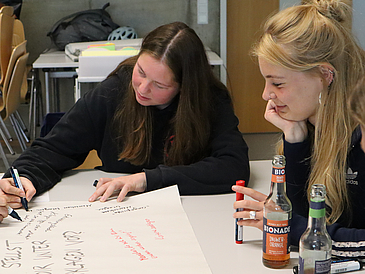Unter dem Titel „Zukunft? Europa? Klimagerecht!“ organisierte das Institut für Europastudien in Kooperation mit dem Fachbereich Rechtswissenschaft und dem Bremer Jugendring einen Workshop im Rahmen der diesjährigen Europawochen in Bremen und Bremerhaven. Nach einem Impuls von zwei Aktivistinnen des Naturschutzjugend Bremen (NAJU) und der Letzten Generation diskutierten rund ein Dutzend Jugendliche und junge Erwachsene im Alter von 16 bis 25 Jahren an drei Themeninseln durchaus kontrovers über den Umgang des Rechtssystems mit zivilem Ungehorsam, einer möglichen Rechtspersönlichkeit für die Natur und Ökosysteme sowie den Möglichkeiten, über den Klageweg politischen, ökonomischen und gesellschaftlichen Wandel zu erreichen. Zum Schluss sammelten die Teilnehmer:innen Ideen für eine klimagerechtere Zukunft in Bremen und Europa.
Institute of European Studies
Welcome to the Institute of European Studies!
European Studies at the University of Bremen are based on the three pillars of political science, cultural history and languages. For Europe is politics, culture, history and multilingualism. With IES, you can choose between the main focuses of European Political Science Studies and European Cultural Studies. You can learn one of four languages: French, Spanish, Russian or Polish.
Master European Politics: Apply now!
The application deadline for starting in the winter semester 25-26 is June 15, 2025!
moreNew posts in our EuropaBlog!
(Please note: these articles are in German only)
Ariane Brachmann writes about the pagan faith of the Romuva and their (non)recognition in Lithuania
Jean Kruschinsky analyzes the new filming of Peter Weiss' Oratorium in elf Gesängen (director: Rolf P. Kahl)
Lea Heitz presents the Sámi, indigenous people in Finnland,in a two-part article
Alona Manhasarian reflects about the political dimension of the European Championship
We look forward to your feedback!
https://blogs.uni-bremen.de/europablog/
Here you can subscribe to our Newsletter!

![[Translate to English:]](/fileadmin/user_upload/fachbereiche/fb8/ies/Logos/Institut_fu__r_Europastudien_oUB_Logo.jpg)
